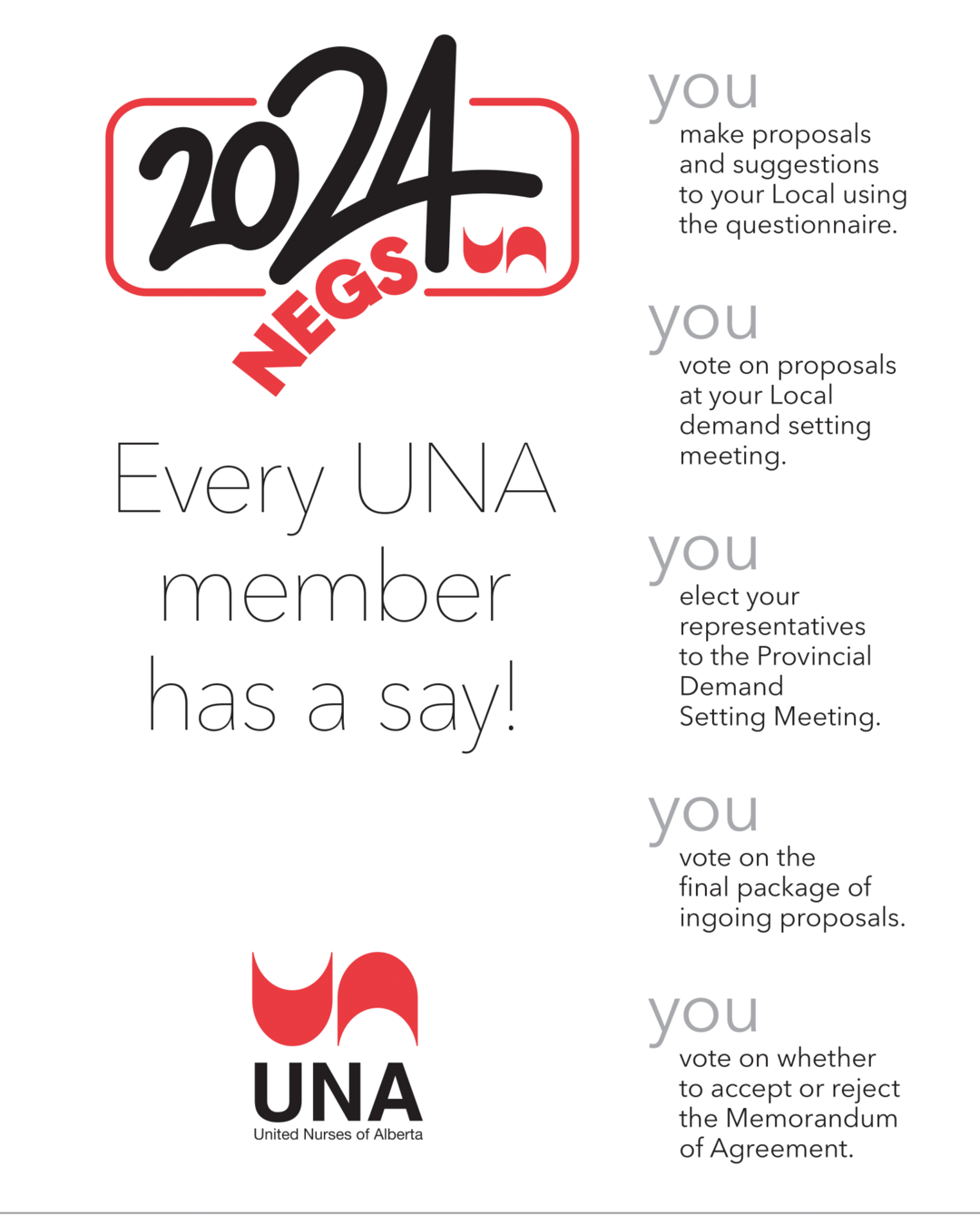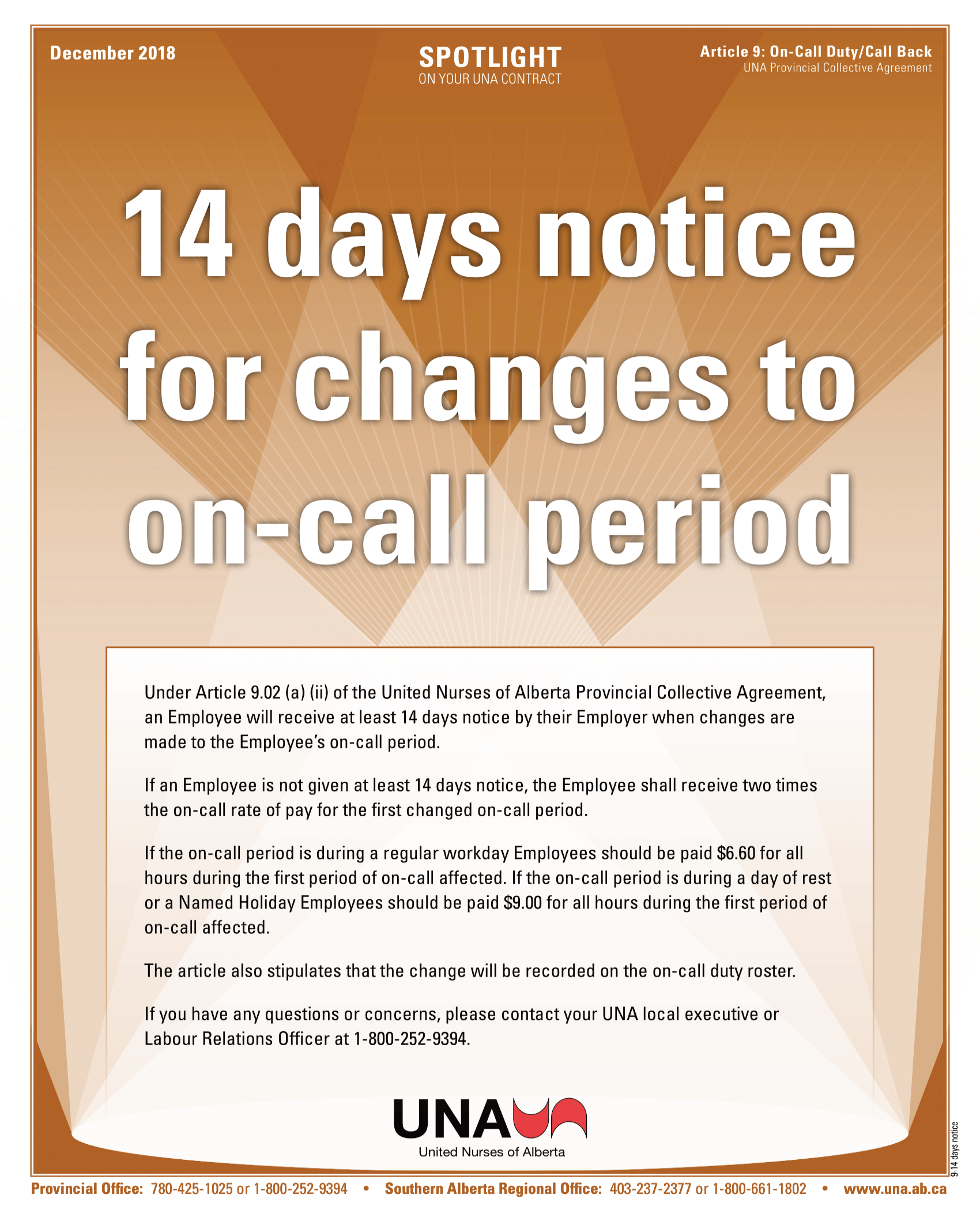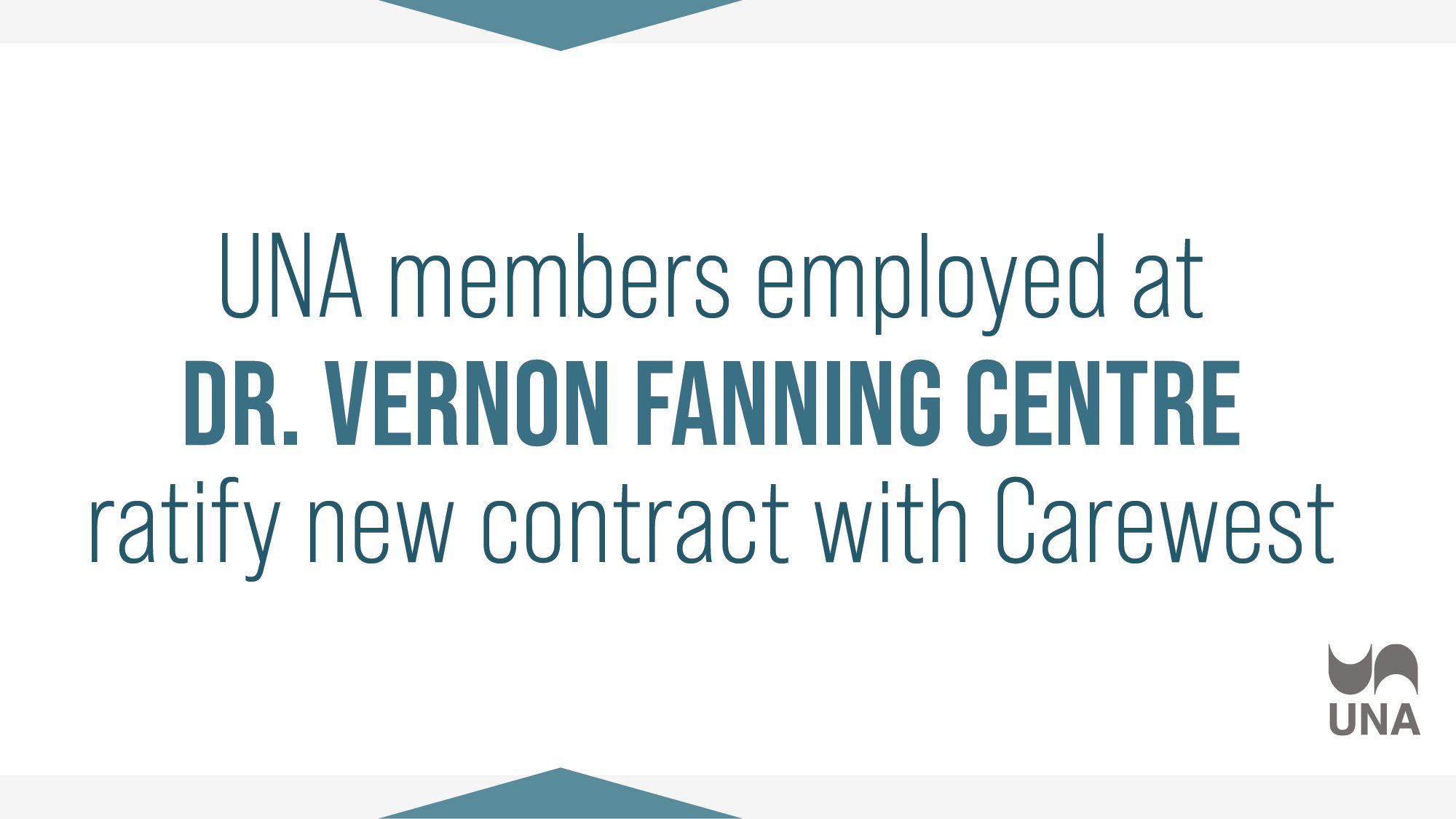Education workshops for UNA members in October, November and December 2023 →
United Nurses of Alberta is pleased to offer in-person education workshops for members in October, November, and December 2023. Any UNA member who would like to become more knowledgeable and engaged can get a head start through the union’s educational workshops, which provide members with a wealth of information, a space for discussion, and activity-based learning.
If a workshop is full, please check ahead for future dates or email events@una.ca to be added to a waitlist.
Full workshop descriptions and funding information can be found on the Education page of the UNA website.
Workshops for All UNA Members:
Boundaries & Self-Care (Online) – October 4, 09:00-12:00
Know Your Rights (Edmonton) – October 5 (waitlisted)
Know Your Rights (Calgary) – October11 (waitlisted)
Dealing With Abuse (Calgary) – October 11 (waitlisted)
Dealing With Abuse (Calgary) – October 12
Know Your Rights (Red Deer) – October 12
Dealing With Abuse (Edmonton) – October 24 (waitlisted)
Dealing With Abuse (Edmonton) – October 25 (waitlisted)
Know Your Rights (Calgary) – November 8 (waitlisted)
Know Your Rights (Edmonton) – November 14 (waitlisted)
Know Your Rights (Edmonton) – November 15
Dealing With Abuse (Edmonton) – November 16 (waitlisted)
Know Your Rights (Calgary) – December 5 (waitlisted)
Know Your Rights (Calgary) – December 6
Boundaries & Self-Care (Online) – December 7, 13:00-16:00
Know Your Rights (Edmonton) – December 12 (waitlisted)
Workshops for Unit/Office Representatives & Local Executives:
Engagement & Support (Calgary) – October 24 (waitlisted)
Engagement & Support (Edmonton) – October 26 (waitlisted)
Taking Action (Calgary) – November28
Taking Action (Edmonton) – November 30 (waitlisted)
Workshops for Committee Members & Local Executives:
OH&S Advanced (Edmonton) – November 7
OH&S Advanced (Calgary) – November 8
Workshops for Local Executives:
Budget Q&A Sessions (Online)
October 4 – 16:00-17:00
October 6 – 09:00-10:00
October 10 – 19:30-20:30
How to Run a Local: Finance (Red Deer) – October 5
How to Run a Local: Administration (Calgary) – October 12
How to Run a Local: Administration (Edmonton) – October 31
How to Run a Local: Administration (Calgary) – November 7
How to Run a Local: Labour Relations (Edmonton) – November 9
How to Run a Local: Administration (Calgary) – November 16
Register Online
UNA members who have activated their UNAnet accounts can register online via DMS. Any Local Executive can register members of their Local in workshops by navigating to Local Admin > Events in DMS. Members are expected to register in workshops closest to their home.
Please check the Events Calendar and DMS Events regularly as the workshop schedule may have changes or additions. Contact events@una.ca with any questions related to workshops or registration.
UNA calls for full public inquiry into Calgary E. coli outbreak →
United Nurses of Alberta calls on the provincial government to launch a full public inquiry into the lab-confirmed E. coli poisonings of more than 350 children at 11 day care facilities in Calgary last month.
UNA believes a panel led by a former Conservative candidate no matter how well intentioned is not sufficient to ensure public confidence in either the conclusions drawn about how this tragedy came to occur or any solutions proposed.
Accordingly, as the representative of Registered Nurses, Registered Psychiatric Nurses and other health care professionals throughout Alberta, UNA urges the provincial government to call a formal public inquiry, led by an impartial judge, under the terms of the Public Inquiries Act.
With a properly constituted public inquiry, the public can be confident that the findings of the inquiry have not been drafted with political considerations in mind, and that the inquiry has the ability to compel sworn testimony by witnesses.
Following the E. coli poisonings that began on the Labour Day weekend, an investigation by public health officials reviewed the food histories of more than 1,000 children and 250 staff members at the day care facilities who had received food from a centralized kitchen business that was operating without a license.
Close to 40 people, almost all of them children, were hospitalized, and at least six required dialysis as a result of the outbreak.
The government announced on September 27 it had formed a “Food Safety and Licensed Facility-based Childcare Review Panel” to be led by former Progressive Conservative candidate and Calgary police chief Rick Hanson.
An investigation by public health officials reviewed the food histories of more than 1,000 children and 250 staff members, the government said at that time.
PRC Best Practice →
Expense Claim or Union LOA? →
National Day for Truth and Reconciliation a time to honour the lost children and survivors of residential schools
September 30 is the National Day for Truth and Reconciliation.
The day was first recognized in 2021 to give Canadians an opportunity to reflect on the tragic and painful history and ongoing impacts of residential schools and honour children who died, as well as the survivors, their families and communities.
September 30 is also the tenth annual Orange Shirt Day, a day during which Canadians are invited to wear orange shirts to honour survivors of residential schools, their families, and their communities.
Orange Shirt Day is an Indigenous-led commemorative day honouring the children who survived residential schools and remembering those who did not. This day relates to the experience of Phyllis Webstad on her first day of school, where she arrived dressed in a new orange shirt, which was taken from her.
The orange shirt is now a symbol of the stripping away of culture, freedom and self-esteem experienced by Indigenous children over generations.
United Nurses of Alberta encourages its members to take time on Sept. 30 to learn more about the dark history of residential schools, as well as Indigenous culture and history, and reflect on the 94 Calls to Action included in the final report of the Truth and Reconciliation Commission.
UNA is committed to reconciliation with Indigenous peoples in Canada and acknowledges that it requires real action on the part of the union and all Canadians, in addition to symbolic activities such as land acknowledgements.
UNA’s Executive Board endorsed a position statement on Indigenous Health and the Truth and Reconciliation Commission, which committed to UNA recognizing the historical fact that Canada’s colonial mission was predicated upon the cultural genocide of Indigenous people.
UNA position statement on Indigenous Health and the Truth and Reconciliation Commission
UNA’s position statement on Indigenous Health and the Truth and Reconciliation Commission, passed by the Executive Board in June 2017, says that “UNA recognizes the historical fact that Canada’s colonial mission was predicated upon the cultural genocide of Indigenous people as has been incontrovertibly established by the Truth and Reconciliation Commission of Canada.
“UNA recognizes the establishment of the Indian residential school and the segregated Indian hospital systems were the preeminent components of that colonial mission and caused deliberate irreparable and ongoing damage to the health and well-being of the indigenous population.
“UNA supports the United Nation Declaration on the Rights of Indigenous Peoples.
“UNA supports the Truth and Reconciliation Commission of Canada’s Calls to Action and particularly those Calls to Action regarding health (Calls to Action 18 – 24).”
Health
18. We call upon the federal, provincial, territorial, and Aboriginal governments to acknowledge that the current state of Aboriginal health in Canada is a direct result of previous Canadian government policies, including residential schools, and to recognize and implement the health-care rights of Aboriginal people as identified in international law, constitutional law, and under the Treaties.
19. We call upon the federal government, in consultation with Aboriginal peoples, to establish measurable goals to identify and close the gaps in health outcomes between Aboriginal and non-Aboriginal communities, and to publish annual progress reports and assess long-term trends. Such efforts would focus on indicators such as: infant mortality, maternal health, suicide, mental health, addictions, life expectancy, birth rates, infant and child health issues, chronic diseases, illness and injury incidence, and the availability of appropriate health services.
20. In order to address the jurisdictional disputes concerning Aboriginal people who do not reside on reserves, we call upon the federal government to recognize, respect, and address the distinct health needs of the Métis, Inuit, and off-reserve Aboriginal peoples.
21. We call upon the federal government to provide sustainable funding for existing and new Aboriginal healing centres to address the physical, mental, emotional, and spiritual harms caused by residential schools, and to ensure that the funding of healing centres in Nunavut and the Northwest Territories is a priority.
22. We call upon those who can effect change within the Canadian health-care system to recognize the value of Aboriginal healing practices and use them in the treatment of Aboriginal patients in collaboration with Aboriginal healers and Elders where requested by Aboriginal patients.
23. We call upon all levels of government to:
i. Increase the number of Aboriginal professionals working in the health-care field.
ii. Ensure the retention of Aboriginal health-care providers in Aboriginal communities.
iii Provide cultural competency training for all health-care professionals.
24. We call upon medical and nursing schools in Canada to require all students to take a course dealing with Aboriginal health issues, including the history and legacy of residential schools, the United Nations Declaration on the Rights of Indigenous Peoples, Treaties and Aboriginal rights, and Indigenous teachings and practices. This will require skills-based training in intercultural competency, conflict resolution, human rights, and anti-racism.
Negs 2024 Timelines & Member Questionnaire
W.E.D. - Wednesday Education Day!
Visit the education.una.ca page to download this document.
Submitting a Union LOA Request (Slides) →
Submitting an Expense Claim →
Dispute Resolution Algorithm
Dispute Resolution Algorithm
Read more14 days notice for changes to on-call period →
2024 Negotiations Timelines
2024 Negotiations Timelines
Read moreRegister for a PRC workshop →
Register for a workshop
Read moreRESPECT. RETAIN. RECRUIT.
RESPECT. RETAIN. RECRUIT.
Read moreFixing the nurse staffing crisis
Fixing the nurse staffing crisis
Read moreIt all begins with RESPECT
It all begins with RESPECT.
Read moreApply for a UNA Nursing Education Scholarship
Apply for a UNA Nursing Education Scholarship
Read moreLabour Day
Labour Day
Read moreCelebrate Labour Day at an event near you
Celebrate Labour Day at an event near you
Read moreUNA members employed at Dr. Vernon Fanning Centre ratify new contract with Carewest →
Members of United Nurses of Alberta employed by Carewest at the Dr. Vernon Fanning Centre in Calgary have voted to ratify their first collective agreement. UNA congratulates and thanks the Local and bargaining team members for their hard-work and solidarity during these negotiations. UNA recognizes the hard work that the members did in getting the word out and canvassing their coworkers during this process.















